TD Magazine Article
Sales R Us!
A review of To Sell Is Human: The Surprising Truth About Moving Others by Daniel H. Pink
Fri Mar 08 2013
To Sell Is Human: The Surprising Truth About Moving Others
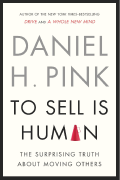
By Daniel H. Pink
(Riverhead Hardcover, 272, $26.95)
Dan Pink has crafted another bestseller. With his signature wit and the quoting of a wad of social science research in To Sell Is Human, Pink has penned a modern day How to Win Friends and Influence People (Dale Carnegie).
To Sell Is Human is chock full of stories, social science, and surprises—such as Pink's debunking of the myth that extroverts are the best salespeople. That's not necessarily the case, he proves to us with his research.
Even more surprising, we all spend approximately 40 percent of our time in nonsales selling—influencing, or "moving" as Pink calls it. Teachers sell education, and doctors sell remedies. What's more, the rise of the entrepreneur has kicked moving into high gear. Entrepreneurs will comprise the majority of the workforce in 2020. According to the Kaufman Foundation, 54 percent of people 18 to 34 years old have started or plan to start their own businesses.
Times have changed. Before, the seller held all of the cards using the A-B-C approach: Always be closing. With the Internet, the information tipping point has shifted toward the consumer, who now walks onto a car lot with reams of research to start the negotiation. The old sales warning used to be caveat emptor. Now, it's caveat venditor.
Seller and customer now have equal power, so a new and very different A-B-C sales model has emerged: attunement (take the other's perspective, use empathy, and mimic the buyer); buoyancy (use interrogative self-talk before, positivity during, and an optimistic explanatory style afterward); and clarity (focus on problem finding—not solving—and look through new lenses).
Pink also discusses three skills required for selling: pitching, improvising, and serving. I found the pitch section fun, especially the Pixar Pitch. Pitching involves using one of many structured ways to present our ideas—think Hollywood. To improvise is to hear offers, say "yes, and," and always think "win-win." To serve is to make selling personal and purposeful, putting others first. As the author says, "Treat everybody as you would your grandmother."
Pink shows us that everyone is moving people toward choices every day. And we must become more skillful at pitching, improvising, and serving.
All leaders—at least those who want to "move" people—should own this book. I give it four cups of joe.
The Wisdom of Failure: How to Learn the Tough Leadership Lessons Without Paying the Price
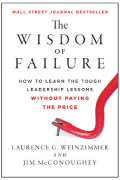
Laurence G. Weinzimmer and Jim McConoughey
Jossey-Bass, 304 pp., $27.95
The Wisdom of Failure is the "how not to" leadership book. Weinzimmer and McConoughey believe the paradox of effective leadership is that leaders can succeed only by knowing failure. As readers will appreciate, the book aims to help them gain knowledge of failure without requiring that they actually fail. Using the results of a seven-year study of 1,000 managers, exclusive interviews from CEOs, and strategies for aspiring leaders, the authors describe some of the most difficult scenarios faced by leaders in the 21st century workplace. Learning from the mistakes of others is a necessary part of one's leadership journey, and this book is a powerful guide toward that end.
Managing Global Innovation: Frameworks for Integrating Capabilities around the World
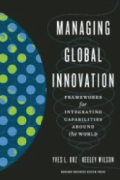
Yves L. Doz and Keeley Wilson
Harvard Business Review Press, 272 pp., $35
Doz and Wilson have recognized a flaw in corporate innovation today: Firms first innovate in their "home base" nations, and then disperse such advances across international markets. However, the authors purport that companies instead should innovate globally, drawing on insights and competencies from around the world. Managing Global Innovation offers ideas about how to foster such practices, manage across geographic borders, and minimize the costs of this boundary-busting approach. Because global innovation is difficult, few corporations today do it well. This book acts as a guide for change by outlining how companies can effectively organize and structure themselves to remain competitive.
The Icarus Deception: How High Will You Fly?
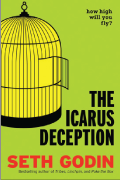
Seth Godin
Portfolio Hardcover, 256 pp., $24.95
From bestselling business author Godin, The Icarus Deception explores the ancient Greek myth about a boy who flies too close to the sun and plummets to his death. The moral of this story? Play it safe. Godin argues that this theme is counterproductive to success in today's economy. He believes that "conformity no longer leads to comfort." His book encourages readers to step outside of their comfort zones and take risks, and provides convincing evidence for why such action leads to a fulfilling profession. This book is an excellent read for managers and employees alike—anyone seeking to improve his career or help others to advance theirs.
What's on Karl Kapp's bookshelf?
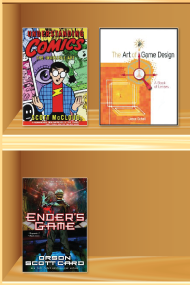
Understanding Comics: The Invisible Art by Scott McCloud. This book ostensibly discusses comics, but in reality it talks about the power of storytelling—the meaning that humans transfer to images and the power of symbols. McCloud creates a fascinating look at the art form of comics using the art form of comics. His book serves as a source of storyboarding and design inspiration on many different levels.
The Art of Game Design: A Book of Lenses by Jesse Schell. Schell provides such an accessible look into the fundamentals of game design in this book that I find myself constantly reaching for it. I refer to it as a source of ideas and direction for instructional game development.
Enders Game by Orson Scott Card. This is a science fiction book that looks at the life of the ultimate game player. It is an interesting mix of games and reality and gives some great insights into games and people.
